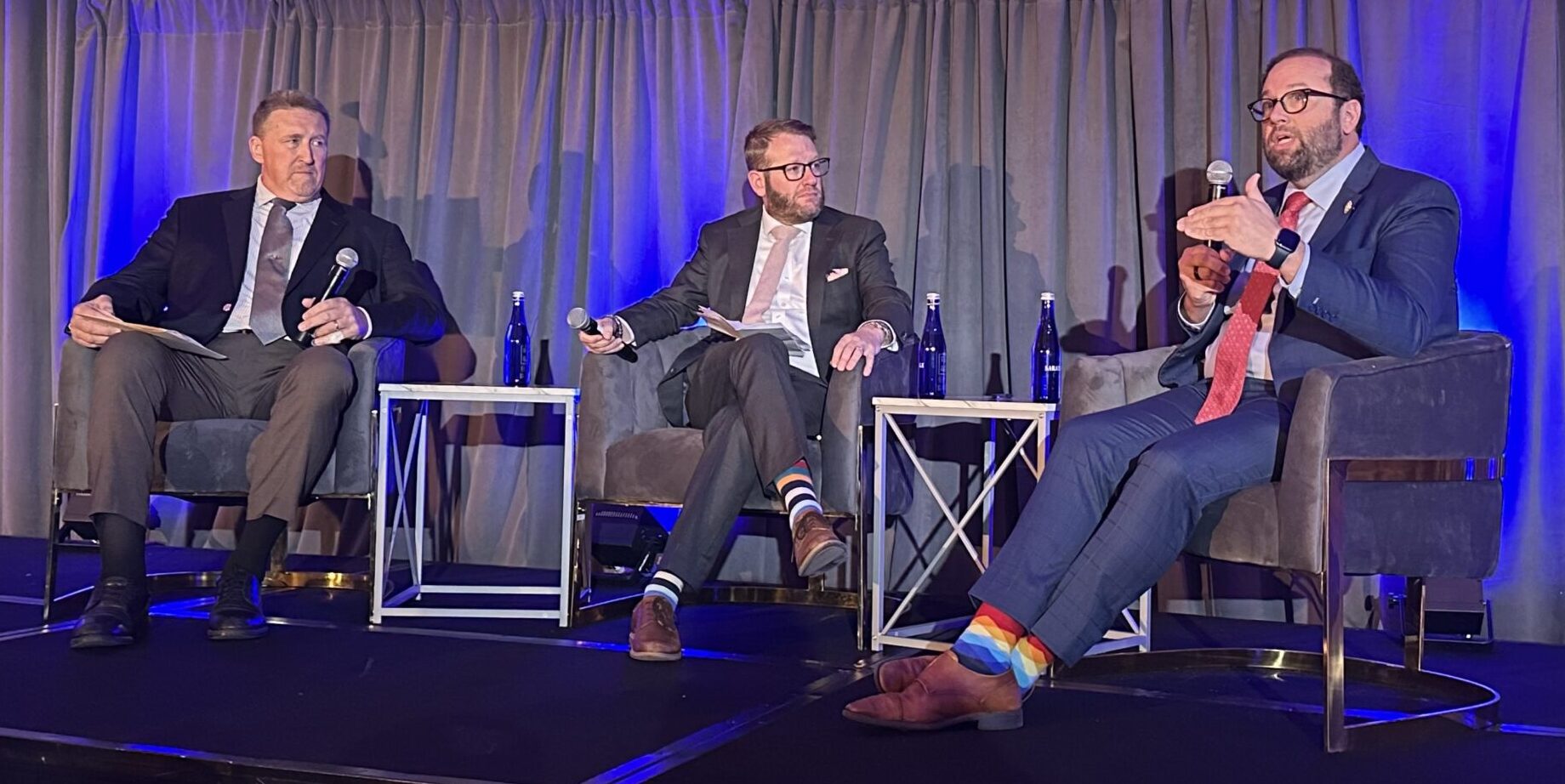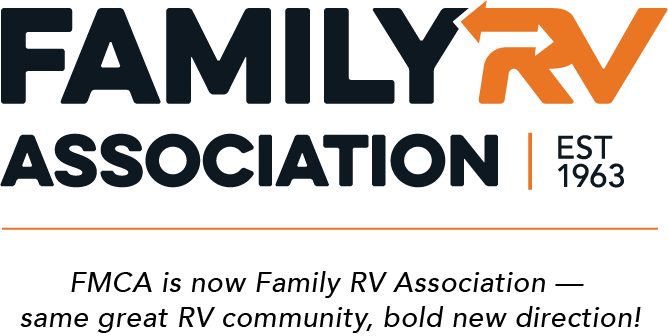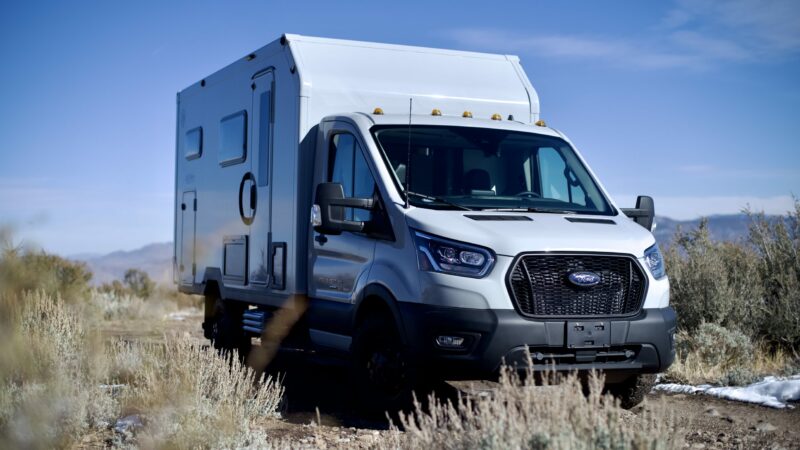U.S. Ways & Means Chair Addresses RV Arena’s Concerns – RVBusiness – Breaking RV Industry News

WASHINGTON D.C. – A last-minute surprise, one of the highlights of Tuesday’s activities during RVs Move America Week – the annual event featuring committee meetings, keynote presentations and Congressional lobbying – was a “fireside chat” with U.S. Rep. Jason Smith, the Missouri Republican who’s the chair of the House Ways & Means Committee.
Hosted annually by the RV Industry Association (RVIA) at The Mayflower Hotel in Washington D.C., RVs Move America Week features industry volunteers who partake in two days of committee meetings followed by Advocacy Day, in which participants will meet with members of Congress and their staffs to discuss issues of importance to the RV industry.
The event also featured two political presentations during the Tuesday luncheon, including the fireside chat that was moderated by RVIA Vice President of Government Affairs Jason Rano and Chad Reece, Winnebago Industries’ Vice President of Government and Industry Relations.
What follows is an edited account of that fireside chat.
On the Big Beautiful Bill Act – which includes the Travel Trailer & Camper Tax Parity provision long sought after by the RVIA and RV Dealers Association (RVDA) – and how it might fare in the Senate after having been passed by the House:
Smith: First, I have to say that my committee member, Rudy Yakym, worked very hard and he followed in the footsteps very well of Ms. Jackie Lewarski. I can remember sitting next to Jackie on the committee for years; I got sick and tired of hearing about this provision and getting dismissed, and I think so did most other members – and that’s the same way with Rudy. I mean, even from the point when Rudy was sitting down with me to try to get on the Ways and Means committee through the steering process, he brought this up and so it’s a huge priority to have on there.
There are also other provisions that’s within the one Big Beautiful Bill that I think it’s important to your industry. It wasn’t something you really asked for, but in the President’s initiative he wanted to allow, for cars and trucks that are manufactured in the United States, that the loans would be tax deductible for individuals. So we also added motorcycles and RVs so that they would be included. So, any RVs manufactured in the United States where someone gets a loan, that’s tax deductible – and that can also happen to help incentivize U.S. manufacturing.
In regards to the Senate, passing the bill out of the House was a huge, huge accomplishment. It wasn’t easy. We passed it 215 to 214 with one voting “present,” so that’s as narrow as a margin that you can get. But it’s all been about balancing the different areas. Is the bill perfect? No, but it is what was necessary in order to get the adequate votes to move forward.
I encourage the Senate to use balance. They have a huge task before them. In the House, we could only lose three votes. In the Senate, they can only lose three votes. So it’s all about balance, whether it’s debt, deficits, whether it’s state and local tax, whether it’s IRA credits. It’s balance. I believe the Senate will keep 90% to 95% of what we’ve done. The President wants it by July 4th. I think we can do it by July 4th.
On the impact RVs Move America Week attendees will have as they meet with members of Congress during Advocacy Day:
Smith: I know you’re going on the Hill tomorrow. That is the best opportunity for you to talk to members of Congress that represent your area, and tell of the real-life impact that their decisions are having on how you do business. That has a bigger impact to me and to the other members than it does compared to when a lobbyist who comes to Washington D.C. or who lives in Washington D.C. and chats with us.
I can still remember the witnesses at our field hearings that were outside of Washington, but I can very seldom ever remember the witnesses that are in the committee hearings here in Washington.
And so, going outside of Washington, hearing from real Americans has a huge impact – huge impact – and reminds us why we’re drafting those policies and how we can deliver results for real Americans.
On the importance of closing the de minimis loophole that is also a provision contained in the Big Beautiful Bill Act:
Smith: So, de minimis reform was something that we passed out of our committee in the last Congress, so it’s something that we have been front and center on for a long time. It’s also something the President has done by executive order.
When you look at de minimis, de minimis creates the opportunity in countries like China to basically have a free trade agreement for any product under $800 and it’s amazing how many products was coming in at $799 so that they’re tax-free. It’s free-trade agreement. In fact, three to five million packages a day come through de minimis from China. That’s just absolutely crazy and it hasn’t been monitored.
Plus, having it in this bill was a very large savings that comes in order to help balance the tax cuts that we did. But this is something that has been very bipartisan in both chambers in looking at codifying de minimis and addressing it. It’s a huge priority to a lot of members of both parties.
On whether the uncertainty created by tariffs will normalize, thus helping restore consumer confidence:
Smith: So let me first say that I have regular conversations with the President of the United States. He actually talks to me more about trade than he does tax policy, which is in our wheelhouse in the Ways and Means committee.
The way that the president has been trying to use the tariffs is to open up more additional markets and 96% of the world’s consumers are outside of the United States. We need to sell our products to other countries, but we also need to make sure that it’s fair trade and it’s also as free trade as possible.
If you look at a study of the average amount of tariffs on U.S. products to other countries, it’s roughly about 18% to 19%. But the average amount of tariffs that we charge products coming into the United States up until the last five months was right around 2% to 3%. Why are those countries charging a 15% on an average higher tariff of goods for our goods, but not theirs?
Ultimately the President has started some agreements with United Kingdom, India, and some other initial ones. There’s more than a dozen and a half of agreements that I know that are yet to be announced that’s out there. I’ve had almost 10 different companies from 10 different countries in the last three weeks that came into my office coming to the table and taking off some of their non-tariff barriers but also the high tariffs.
And so hopefully when we get to these agreements, it will create long term certainty. That’s why I wanted to get the tax bill done quickly, to provide certainty for businesses when it comes to the tax code. And we need to provide that certainty when it comes to a trade policy.
But I am so thankful we have a president that cares about trade because the last four years it was like trade was non-existent. And for a president to actually push trade, push the conversations, these countries would’ve never come to the table. They absolutely would’ve never come to the table.
They didn’t care because if you’re getting fed dessert before the main course, you’re never going to eat the main course. So why would you tell somebody differently? And that’s the case. Now they’re having to eat their vegetables before they get their dessert.
So, that’s all part of it. And it’s a little bit bumpy for a while, but I really believe in the long run this is going to be much better for U.S. workers and U.S. manufacturers.
On the prospects of Generalized System of Preferences (GSP) Reauthorization being passed, thus providing relief for specific imported products such as lauan plywood:
Smith: GSP is something that we passed out committee last Congress. Unfortunately, it was very partisan. We couldn’t get one Democrat to support it. They say they support GSP, but they voted against it because they wanted something completely unrelated. Not that they oppose anything GSP; unfortunately, that’s politics in Washington.
I think GSP is going to be a little bit harder of a lift, however the rest of this Congress we’re going to be focused on trade policy. It’s going to be a huge priority and trade policy has to be bipartisan. It’s just the only way you’ll be able to pass trade policy because both Republicans and Democrats have such strong opinions on various trade provisions.






